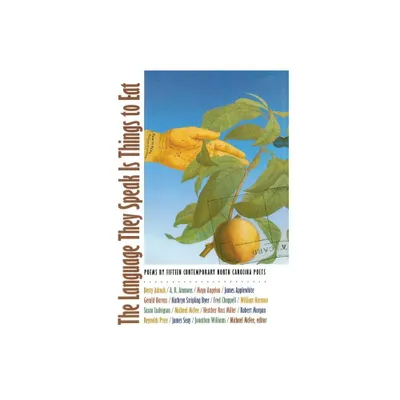Home
Speaking of Forms Life: The Language Conservation
Loading Inventory...
Barnes and Noble
Speaking of Forms Life: The Language Conservation
Current price: $139.99


Barnes and Noble
Speaking of Forms Life: The Language Conservation
Current price: $139.99
Loading Inventory...
Size: Hardcover
*Product Information may vary - to confirm product availability, pricing, and additional information please contact Barnes and Noble
Humans pose an unprecedented threat to life in all its great diversity of forms. The human-induced extinction rate has been compared to “mass extinctions” of the past. But this language masks the fact that the crisis is due to voluntary, and thus, avoidable choices and actions.
“
Speaking of Forms of Life”
shows that at the root of this crisis is the tragic inadequacy of the language predominantly used to represent and address what we are doing, including the language of “sustainable development,” “rights” for animals and the rest of nature, their “intrinsic value,” and conservation of species as “populations.” This talk alienates us from the other living things, from what they actually are, have and do, and it perpetuates the harm and loss. Campagna and Guevara compellingly argue, on rigorous but accessible grounds, that there is an alternative language to guide conservation, in confronting the radically urgent, ethical issues it faces. This is a language with which we are all familiar, mastered by naturalists, from Aristotle to Audubon. It articulates the primary value in life and the standard that must guide how human beings should live, as one form of life, among countless others. This book is a homecoming for those who practice conservation to, above all else, secure a creature’s ability to satisfy the necessities of its form of life.
"This is an essential book for anyone who cares about conservation and is concerned about the frightening pace of extinctions. The great theme of the book is the importance of the language in which we think and talk about living beings. Daniel Guevara and Claudio Campagna make available for conservationists the ground-breaking work of Philippa Foot and Michael Thompson on natural goodness and on our thought about living beings. They show how it can be brought to bear on the threats that confront conservation and on disputes that may seem irresolvable. I recommend
Speaking of Forms of Life
as strongly as I can.”
Cora Diamond
William R. Kenan, Jr. Professor Emerita of Philosophy, Professor of Law, and University Professor, University of Virginia
“Our current conservation language is shot through with economic platitudes that don’t explain anyone’s real motives for conserving biodiversity. Campagna and Guevara’s new book lays out a convincing alternative, grounding conservation goals in the objective goodness of life’s many ways of flourishing.
is inspiring, informative, well-grounded in the relevant philosophy and conservation literatures but never pedantic. Both activists and thinkers will find much of value in
.”
Philip Cafaro
Professor of Philosophy, Colorado State University
helps us confront the fact that language often obscures, rather than facilitates, our understanding of living things. Our language reflects past misperceptions, current ignorance, and our shockingly limited intellectual ability to comprehend where we are in space and time, and who we are with on this strange planet with its soap-bubble coating of life. The language in use has abetted, and accelerated the catastrophic course we daily continue to choose.
shows us why and how this must change. It’s a crucial revelation that we must heed, because our species alone can consider changing course—and our species alone must do so.
Carl Safina
MacArthur Fellow Carl Safina Research Chair for Nature and Humanity, Stony Brook University
"Our biosphere is a miracle. Communicating the sense of awe and wonder that it instills in many of us is essential to shift from wanton destructionof our natural world for short term economic profit to health and prosperity for all creatures - including us humans.
is the first book that unveils how the way we speak to each other affects the way we value and care for our planet. An essential read for everyone who cares about the future of nature and humanity."
Enric Sala
National Geographic Explorer in Residence and Hubbard Medalist
“
Speaking of Forms of Life”
shows that at the root of this crisis is the tragic inadequacy of the language predominantly used to represent and address what we are doing, including the language of “sustainable development,” “rights” for animals and the rest of nature, their “intrinsic value,” and conservation of species as “populations.” This talk alienates us from the other living things, from what they actually are, have and do, and it perpetuates the harm and loss. Campagna and Guevara compellingly argue, on rigorous but accessible grounds, that there is an alternative language to guide conservation, in confronting the radically urgent, ethical issues it faces. This is a language with which we are all familiar, mastered by naturalists, from Aristotle to Audubon. It articulates the primary value in life and the standard that must guide how human beings should live, as one form of life, among countless others. This book is a homecoming for those who practice conservation to, above all else, secure a creature’s ability to satisfy the necessities of its form of life.
"This is an essential book for anyone who cares about conservation and is concerned about the frightening pace of extinctions. The great theme of the book is the importance of the language in which we think and talk about living beings. Daniel Guevara and Claudio Campagna make available for conservationists the ground-breaking work of Philippa Foot and Michael Thompson on natural goodness and on our thought about living beings. They show how it can be brought to bear on the threats that confront conservation and on disputes that may seem irresolvable. I recommend
Speaking of Forms of Life
as strongly as I can.”
Cora Diamond
William R. Kenan, Jr. Professor Emerita of Philosophy, Professor of Law, and University Professor, University of Virginia
“Our current conservation language is shot through with economic platitudes that don’t explain anyone’s real motives for conserving biodiversity. Campagna and Guevara’s new book lays out a convincing alternative, grounding conservation goals in the objective goodness of life’s many ways of flourishing.
is inspiring, informative, well-grounded in the relevant philosophy and conservation literatures but never pedantic. Both activists and thinkers will find much of value in
.”
Philip Cafaro
Professor of Philosophy, Colorado State University
helps us confront the fact that language often obscures, rather than facilitates, our understanding of living things. Our language reflects past misperceptions, current ignorance, and our shockingly limited intellectual ability to comprehend where we are in space and time, and who we are with on this strange planet with its soap-bubble coating of life. The language in use has abetted, and accelerated the catastrophic course we daily continue to choose.
shows us why and how this must change. It’s a crucial revelation that we must heed, because our species alone can consider changing course—and our species alone must do so.
Carl Safina
MacArthur Fellow Carl Safina Research Chair for Nature and Humanity, Stony Brook University
"Our biosphere is a miracle. Communicating the sense of awe and wonder that it instills in many of us is essential to shift from wanton destructionof our natural world for short term economic profit to health and prosperity for all creatures - including us humans.
is the first book that unveils how the way we speak to each other affects the way we value and care for our planet. An essential read for everyone who cares about the future of nature and humanity."
Enric Sala
National Geographic Explorer in Residence and Hubbard Medalist


















